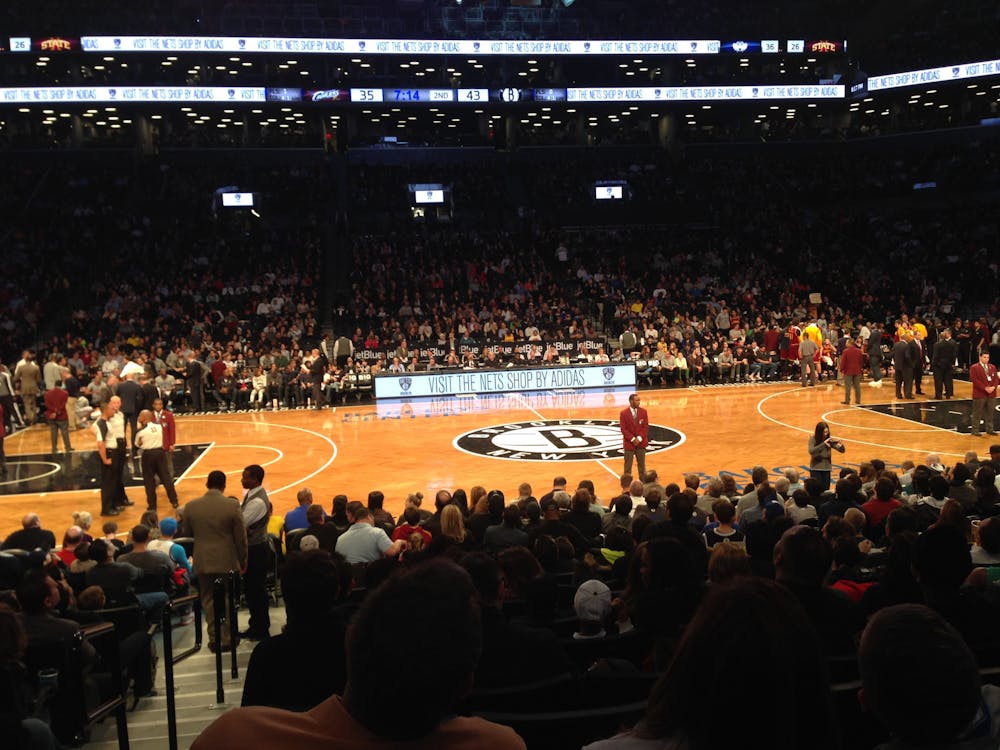
Most of the world was asleep at 1:30 a.m EST on Feb. 9. Little did they know that one of the biggest superstars in NBA history was about to be traded. In the early hours of the morning, the Brooklyn Nets traded forward Kevin Durant to the Phoenix Suns.
It is likely that this trade will have long-lasting, rather than immediate, effects. We won’t know with certainty which team truly won this trade for another three to five years. The winner of this trade shouldn’t necessarily be determined by where these two teams finish this season.
With that being said, it’s important to rewind to the week before the Durant trade. Prior to the Feb. 9 trade deadline, the only seriously rumored trade partner for former Nets point guard Kyrie Irving was the Los Angeles Lakers, who were rumored to be offering Russell Westbrook as well as their 2027 and 2029 first-round picks. To many, this seemed like the best available trade package for the Nets.
This move not only would match contracts between Westbrook and Irving but, as Westbrook is on an expiring deal, would also allow the Nets to begin rebuilding immediately without being in a bad, long-term salary cap situation. Also, with two more first-round picks added, they would have more chances to strike gold in the draft years from now.
The Nets opted instead to accept a last-minute Dallas Mavericks trade package, which included Dorian Finney-Smith, Spencer Dinwiddie, an unprotected 2029 first-round pick and second-round picks in 2027 and 2029. This move immediately suggested to many that the Nets would attempt to stay competitive while building around Durant. Much to everyone’s surprise, not even a week later, the Nets traded Durant to the Suns for Mikal Bridges, Cameron Johnson, four first-round picks and a future pick swap.
What makes this trade interesting is that the Nets have actually been a below .500 team since the trade deadline. After Sunday’s win against the Denver Nuggets, the Nets are now 6–7 since the deadline but have won five of their last six games. The biggest takeaway from the trade has been how valuable the newly acquired players have been, especially defensively. Finney-Smith, Johnson and Bridges provide switchability that fits Head Coach Jacque Vaughn’s defensive philosophy. Previously, he didn’t have the personnel to employ such a switch-heavy defensive system, but now he can.
The four-man lineup of Nicolas Claxton, Finney-Smith, Johnson and Bridges has posted a defensive rating of 103.4 this season, which is the definition of elite. The biggest issue has been the offense. Despite the stellar defense, the offense has been abysmal, posting a 113 offensive rating since the trade, which brings us back to the big question of where the Nets go from here.
The Nets have an excellent and promising defensive roster with the potential to improve offensively. Right now, their entire offense is around Dinwiddie and Bridges, which isn’t a good enough offense to be a serious competitor in the Eastern Conference. Their highest-paid player is Ben Simmons, who provides little offensive value and is rarely healthy enough to justify his contract. Though Simmons’ calling card is defense, he hasn’t played much since the deadline, and the Nets’ defense has been just fine without him. The Nets should look to move Simmons as soon as possible if the goal is to stay competitive. It may require attaching a first-round pick, which seems worth it.
The San Antonio Spurs, Charlotte Hornets, and Utah Jazz are three teams that could be willing to take on a Simmons contract given that they are trying to lose games to acquire better picks in the future.
If Brooklyn can get some players in exchange for Simmons that are more moveable in another trade and that help the Nets improve their offense, that would be a massive win for the franchise. The bottom line is that the Nets’ goal this offseason should be to move Simmons by any means necessary.
Another player they should look to move is Joe Harris. His contract will be another difficult one to move because he is making almost $20 million next year. The bright side of his contract is that it expires after next season so there is no particular rush to get a deal done; however, the Nets’ biggest priority this summer should be figuring out a way to extend core players like Johnson and Claxton while also being able to afford extending rotation players like Royce O’Neale and Seth Curry.
For a team that is currently $13 million over the cap right now, they must find a way to get back under. Trading Simmons to a rebuilding team and Harris to another contending team in the league would be a great way to set the Nets up long-term as they enter a new era of franchise history.
For many fans, it may be hard to see a bright future in Brooklyn after trading their two superstars; however, if they play their cards right, it’s not far-fetched to think that the Nets could be in a good or even better situation long-term than they were two years ago. The team has a futuristic defensive roster that is extremely switchable and has all-league defenders at almost every position. That type of roster isn't regular; it’s a luxury. The Nets should be looking to build around their new roster in a way that maximizes that luxury.





